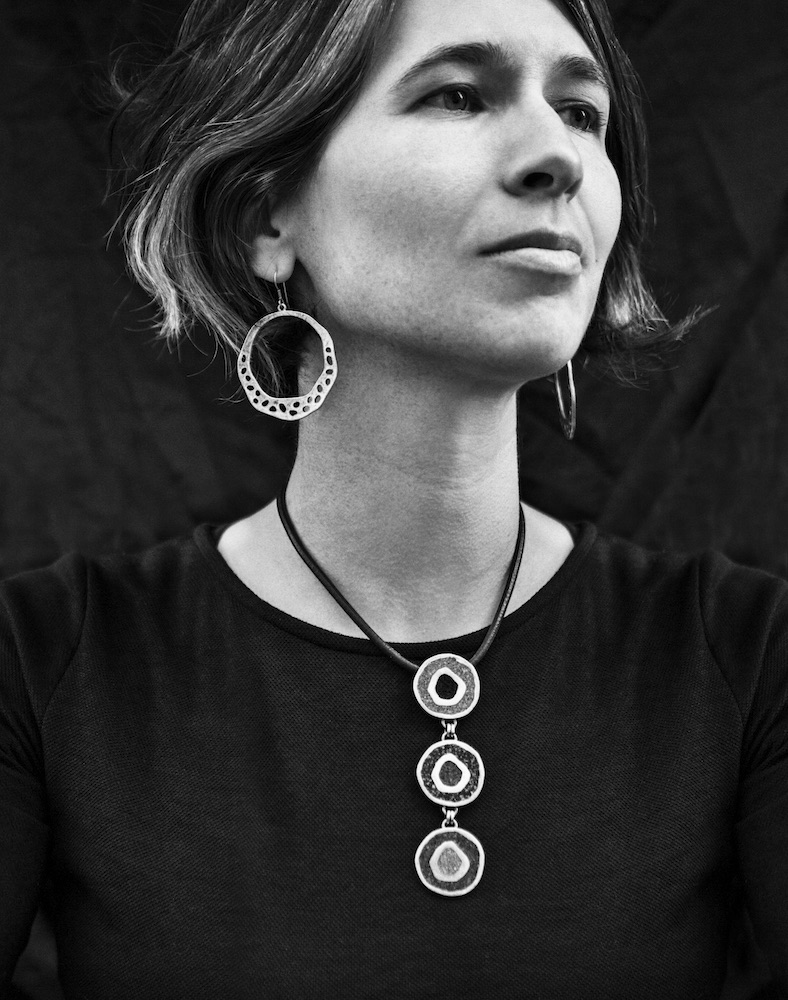The Mystery Writer

IDRA NOVEY IN NEW YORK, DECEMBER 2015. PHOTO: VICTORIA STEVENS.
Beatriz Yagoda, a celebrated Brazilian novelist, was last seen climbing into an almond tree with a suitcase in hand. Five days later, she is nowhere to be found. Her book sales increase and her two children, Raquel and Marcus, and American translator, Emma Neufeld, begin to worry.
“It began with this idea of a disappearing author,” explains poet, professor, and translator Idra Novey of her debut novel Ways to Disappear (Little Brown). “But I think it also began with me,” she continues. “I was running a translation program in the MFA at Columbia University and I had a kid and I was on deadline for this translation that I really wanted to get out, and I actually fantasised about disappearing into a tree.” She chose an almond tree for its fragrance. “I think when you have a lot of demands on you, a tree starts to look like an increasingly appealing escape route,” she adds.
Escape, jokes Novey, has been a recurring theme in her life. Raised in a small mining town in Pennsylvania, Novey fled to New York for university and then to South America after graduating. She lived in Chile and Brazil, and became fluent in Spanish and Portuguese. She wrote award-winning poetry and like Emma, the protagonist of Ways to Disappear, Novey began translating Brazilian literature into English. “When you translate, you have to get really deep into the mindset of the writer you’re translating. You’ll start to anticipate why they chose to use these words in this order and figure out where they are coming from,” she says. “It’s very similar to how you have to figure out your character’s motivation [in fiction].”
Written in short poetic chapters and punctuated with dictionary definitions, Ways to Disappear is both a meditation on the art of translation and a classic mystery complete with loan sharks, amateur detectives, and an ill-advised romance. “It was freeing to play with this noir aspect—the ransom notes and all of that,” says Novey. “I really thought of it as a thriller with some theories, and that juxtaposition is what really interested me. To go from the high to the low, the noir feel and then also my notions that I’ve been teaching all these years.”
Based in Brooklyn with her husband and children, Novey currently teaches creative writing at Princeton and has previously worked with the Bard Prison Initiative.
EMMA BROWN: Where did you grow up?
IDRA NOVEY: I grew up on the Pennsylvania border with West Virginia—sort of Pennsatucky, Rust Belt, nowheresville, basically. After college I moved to Chile and after Chile I moved to Brazil. Then I moved back to New York.
BROWN: What brought you to South America?
NOVEY: I had studied Latin American literature in college and I wanted to live there. I also fell in love with somebody who was Chilean—that’s a great motivation. But when I was living in Chile, I was studying Portuguese because I knew I wanted to translate Brazilian literature. All of my favourite authors were there. So when I got married, we took all the money from our wedding and moved to Brazil until the money ran out. Moving back then to New York we had nothing, but it was worth it, because otherwise I wouldn’t have written this book.
BROWN: Latin American literature isn’t something you associate with growing up in the Rust Belt. Were you parents like, “Why do you want to study that?”
NOVEY: You would think so, but my parents are as strange as I am. We never really fit in in our small town, and we always had exchange students in our house. We were four siblings, and then we had an exchange student live with us for a year from Argentina and another exchange student from Brazil. I loved the Brazilian food [the Brazilian student] made. He was my age, and we were in school together, so I basically had a Brazilian brother for a year in high school. We stayed in touch with their families and they always sent us gifts and music and we’re still in touch. When I went to Brazil, I went and visited his family.
BROWN: Were you one of those children who was always writing short stories?
NOVEY: Oh yes. I made up skits at the bus station when I was a kid and everybody was waiting for the bus. It was in the Appalachian Mountains, so it was freezing. Then I wrote out plays on a typewriter and passed out copies and made my siblings and the neighbors do these plays with me. I was always this eccentric kid in the neighborhood who was writing things.
BROWN: Are your siblings older or younger?
NOVEY: I have a sister and step brothers, and I’m in the middle. I think middle children are often the ones who flee to another continent and [engage in] other shenanigans. No one’s paying attention to you anyway, so you might as well just pack your bags and go.
BROWN: Of the plays you wrote when you were little, is there any one that feels particularly significant?
NOVEY: I wrote a play when I was in high school, it was actually performed at my high school. Sadly, it was about a boy I had a crush on, and he didn’t come because he was on a sports team. I don’t think he even knew the play happened.
BROWN: That’s probably a good thing.
NOVEY: I was crushed at the time.
BROWN: Did he know…
NOVEY: That I existed? Hard to know. There was a ghost in it though. It wasn’t straightforward. I never did straightforward stories. They always seemed a little too predictable. Why stick to reality if we don’t have to? It’s much more fun, if you’re writing, to shake it up a little. Keep people guessing.
BROWN: Did you ever go to a reunion?
NOVEY: No. I feel like I really didn’t belong in that town for many reasons. I started counting down the days to leave high school my freshman year.
BROWN: Where did you go to college?
NOVEY: I went to Barnard, and when I got to Barnard I was already counting down the days until my semester abroad. It really took me a while to figure out where I didn’t want to keep fleeing from. It was always in my head that there was some other place, and then I was like, “I think the place where I’m happiest is in fiction.” For me, it was always about planning the fantasy. I spent my entire childhood fantasising about getting the hell out of there.
BROWN: You mentioned all of your favourite authors were Brazilian. Who specifically?
NOVEY: Clarice Lispector for sure. I read her when I was in college and she changed my life.
BROWN: You translated one of her books.
NOVEY: I did. I translated one of her books for New Directions. Before that I translated some other Brazilian authors, but I knew she was the golden egg. I think it was great practice, because she’s a really difficult, intense writer. When Barbara Epler from New Directions called she basically answered my dreams. They asked me to do my favourite book of Lispector’s [The Passion According to G.H.]
BROWN: There are some great lines in Ways to Disappear about the relationship between the translator and the author. How close do you feel to the authors you translate?
NOVEY: I’ve translated authors who are alive and authors who are dead, and it’s a very different conversation. With an author who’s alive, you can send emails and ask questions. When an author’s deceased, as Clarice Lispector is, you have to come up with your own answers, and they almost become a character in your head. You have to create both sides of the conversation yourself, so I was creating this character of this author I was translating, and then I just kept going with it, turning her into another character entirely. The character in the novel is definitely not Clarice Lispector but was inspired by my relationship in my head with this author I had made for myself.
BROWN: Did finishing Ways to Disappear feel anticlimactic?
NOVEY: It takes so long to do a book. I’m pokey. I come from poetry so I really labor over every sentence and revise and revise and revise, so by the time I finished this novel I was already excited to flee to another one. That was the motivation to get it done—I had already come up with other ideas.
BROWN: There’s a moment in the book when Raquel finds her mother’s drafts saved on the computer, and each draft is of the same scene with one little detail changed or word changed. Is that how you work? Will you rewrite a scene and just change the colour of someone’s dress?
NOVEY: I think it is. It didn’t occur to me, but yes, absolutely. In poetry, everything hinges on an image, and I think I write that way. Or maybe it’s just delusional optimism: “This scene is really going to work if I change the color of the table.” “This conversation will definitely work if I get better chairs.” Sometimes it does work, because you’re like, “Why did I move the chairs? Oh, because they should be at the bar.” And then it leads you.
BROWN: Did you ever get traditional writer’s block?
NOVEY: I always knew the plot, and I think once you come up with a mystery or a thriller, it keeps going, it creates this engine and you just have to keep putting more fuel in. I knew there would be this loan shark chasing a larger group of people, so once I came up with that, I had that looming threat and I could keep it going.
BROWN: Did you set out to write very short chapters, or is that something that just happened?
NOVEY: I came to this from prose poetry, so I like working in these discrete blocks and perfecting them. I wanted to make them these jewel-like discrete sections and savor writing each one. It was like decorating a room—if I were an interior decorator, which I don’t think I ever would be, I’d definitely work room-to-room. The word “stanza” in Latin comes from “room.” I saw each page as a stanza, a room, and what was the feel of the room? What was the color of the room? Get that room right and then move in the house into the next room.
BROWN: How did you discover poetry? It’s not a very popular form anymore.
NOVEY: I think it was my interest in images and staying with an image and going deep into its meaning. Poetry is a great place to do that. But I always had this storytelling impulse. As I was saying earlier, I wrote all these plays in high school and I really like dialogue. I think at a certain point, only doing poetry became not feasible because I wanted to play around with these voices and conversations and you can’t do that in poetry. I had to do the novel.
BROWN: Do you work in the same environment when you’re translating as when you’re writing fiction?
NOVEY: Right now, I’ve been translating an Iranian poet. I don’t speak Persian, but an Iranian grad student at the University of Oregon named Ahmad Nadalizadeh contacted me. He was translating this poet in Tehran named Garous Abdolmalekian. [Garous] wanted Ahmad to work with an American poet, because Ahmad’s first language is not English—and do the poems together. So he contacted me, and I was like, “I really don’t have time to do this but I’ll look at the poems and see who might be a good match.” Then I looked at the poems, and as happens with every single book I translate, I was like, “These are incredible. It’s a crime for these poems not to be in English.” I connected with them immediately and I couldn’t say no. But I found if I do one or two in the morning, it gets me back in the writing mode. His poems are just stunning. There’s so much in the news about what’s happening in the wake of Arab Spring and it’s really meaningful to work on these poems and think about this young poet living in Tehran and his reality. I think that’s why I love translating—it gets me out of my Brooklyn life. Translation is a really great way to go to another country.
WAYS TO DISAPPEAR COMES OUT FEBRUARY 9, 2016, VIA LITTLE BROWN.
For more from our 16 Faces of 2016, click here.






